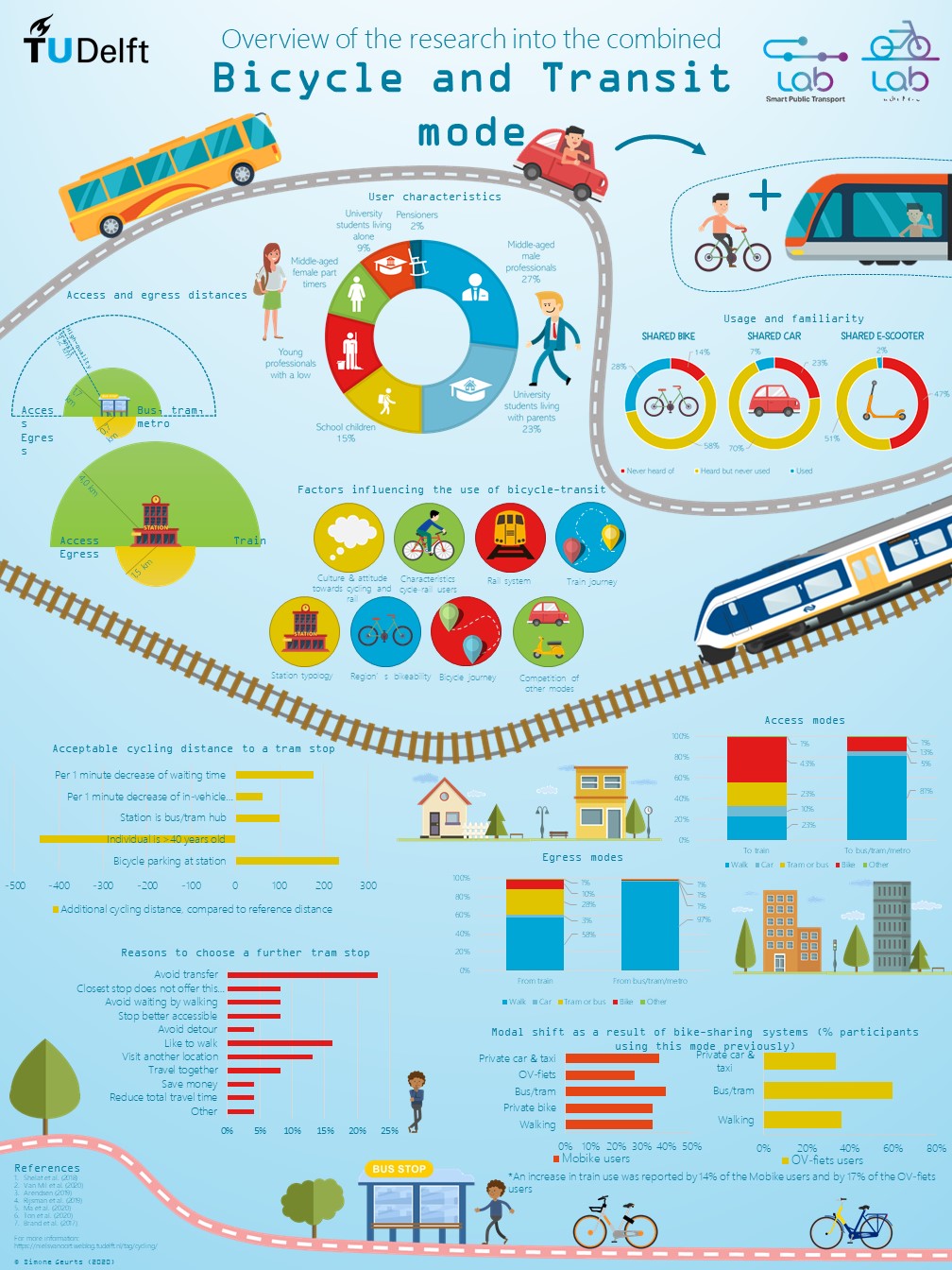Posts in category Presentations
The future of public transport in the era of emerging modes
Due to societal and technological trends and developments, new modes (will) emerge. In this workshop at the Urbanism Next Europe conference, Maaike Snelder (TNO/TU Delft), Maria Alonso-Gonzalez (KiM) and Niels van Oort (TUDelft) shared their research findings about on-demand pooled services, autonomous shuttles and share bicycles and discussed about their contribution to the future of public transport.
Find the presentations, including references, here:
Train traveller behaviour during and after Covid: insights of a longitudinal survey of Dutch train passengers
The pandemic had (and still has) an obvious impact on public transport (use). To gain insights into passenger behaviour during and after the pandemic, a longitudinal survey is organised with the goal to capture behaviour, attitudes and intentions related to train usage. Four surveys were held between April and December 2020, involving 23,000-47,000 passengers each. The results provide valuable, quantitative insights that help to recover and rethink public transport after the pandemic, for instance by adjusted planning, design and operations. Findings show that 30% of the passengers want to avoid the peak hour after Covid and 72% will telework more often, saving multiple trips per week. The most popular days for teleworking will be Friday and Wednesday. Related future research directions are for instance developing more flexible and demand-driven schedules and services.
Read more in the PAPER by Mark van Hagen et al. or check the PRESENTATION at the BIVEC Transport days
Workshop Future of Public Transport @Forum ISTS
Due to societal and technological trends, our mobility system and patterns might change. New modes are entering (and leaving) the market, while conventional modes are improved. In this workshop we looked to the future of public transport from the perspective of authorities and operators. The city of The Hague and the Dutch railways (NS) shared their visions on the public transport of the future.
Find the general workshop presentation HERE
Find the presentation of Emile Jutten (City of The Hague) on the national and regional vision on public transport HERE and an animation of the vision HERE
Find the presentation of Mark Oldenziel (NS) on the short term innovations and plans of the railways HERE and an animation of the vision HERE
How do Dutch train passengers (expect to) travel during and after Covid?
Thursday 5th November, the ETC Programme Committees for Local Public Transport and Rail Policy and Planning hosted a Covid webinar on: “How do Dutch train passengers (expect to) travel during and after Covid? Insights from a longitudinal panel of over 20,000 train passengers”, by Mark van Hagen (Netherlands Railways) and Niels van Oort (TU Delft). Together, Mark and Niels initiated a longitudinal survey amongst Dutch train travellers and how they cope with Covid with regard to their (future) travel patterns. In this webinar, they will share the main findings and lessons. A reflection from a wider EU perspective will also be given by András Munkácsy, Head of the Department for Transport Management at the KTI Institute for Transport Sciences, Hungary.
Find the presentation HERE
Travellers’ preferences towards existing and emerging means of access/egress transport
This research elaborates on access/egress transport in further detail and aims to provide insights in the preferences of travellers for existing and new means of access/egress transport such as shared vehicles and on-demand ride services. In this research, a stated preference experiment was performed with Dutch train travellers. In addition to the modal preferences, the expected impacts on land use near train station were assessed.
Find the ETC presentation of Bas Stam HERE
Subjective Beliefs regarding Waiting Times in Public Transport Networks in the Netherlands, Greece, and Portugal
Waiting times in public transport networks (PTNs) are inherently uncertain for travellers and, similar to other service industries, such uncertainty is likely to be a major cause for anxiety and frustration (Maister, 1985). While real-time information regarding waiting times is an important development in mitigating such negative feelings, they do not completely remove uncertainty. Even when information is provided, travellers process it on the basis of their individual attitudes, habits, experiences, and contemporary contextual variables. Yet, previous studies on behavioural responses to travel time unreliability have either (unrealistically) assumed that travellers know the objective travel time distributions or have studied behaviour within the artificial context of travel simulators. Quantifying travellers’ attitudes and perceptions — subjective beliefs — regarding waiting times may be critical for assessment of travel satisfaction and subsequently choice behaviour.
In this research, a stated preference experiment is used to quantify travellers’ attitudes and perceptions — subjective beliefs — regarding waiting times in public transport networks in three European countries. Results and potential policy implications are presented at the European Transport Conference (ETC).
Find the ETC poster of Sanmay Shelat HERE
Overview Bicycle+Transit research

Download the poster HERE
References:
Shelat et al.(2018), Characteristics bicycle and transit users
Van Mil et al.(2020), Factors affecting the bicycle and transit mode
Arendsen et al. (2019), Shared mobility for the first and last mile
Rijsman et al. (2019), Walking and bicycle catchment areas of tram stops: factors and insights
Podcast: Bicycle+transit mode
The bicycle+transit combination has been a growing mode for years now. It could offer the best of both worlds, if it is well designed with an integrated perspective. In this Dutch Cycling Embassy podcast with Geert Kloppenburg and Chris Bruntlet, we discuss about the opportunities and challenges regarding shared bicycle systems.
Find the podcast here:
Podcast Bicycle+Transit
Find the related references here:
Insights and overview research findings (lecture slides; Van Oort, 2020)
Shelat et al.(2017); Characteristics bicycle and transit users
Van Mil et al.(2020); Factors affecting the bicycle and transit mode
Fietsparkeren bij stations en haltes: kansen (on)mogelijkheden (deel)fiets+ OV
De combinatie van fiets+OV is groeiende. Maar tegelijkertijd zien we ook de stallingsdruk en -problemen toenemen. Hoe kunnen we de groei blijven faciliteren en wat is de mogelijke rol van de deelfiets hierin? Tijdens het fietsparkeercongres in Utrecht deelden we onze inzichten vwb het gebruik(svoorkeuren) van de combinatie (Deel)fiets+OV.
